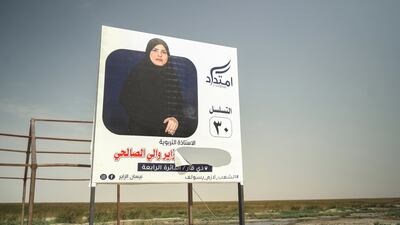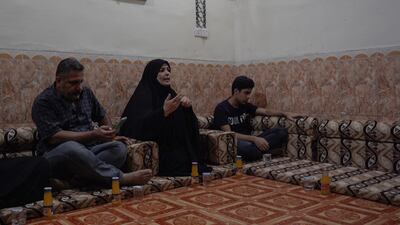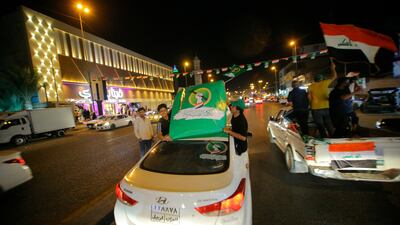Despite the many challenges facing women in Iraq’s male-dominated society, Nissan Al Salhy is determined to pursue a career in politics.
The Arabic teacher from the southern province of Dhi Qar is vying for a seat in parliament in Sunday's national elections, joining a new generation of young women seeking a powerful role in politics for the first time in their lives.
human rights activist
Since the 2003 US-led invasion that toppled Saddam Hussein’s regime, “the situation of women in Iraq has been very bad”, Ms Al Salhy, 45, told The National while on her way to an event to speak to women voters.
“They are under huge pressure in a traditionally male-dominated society regardless of whether they are strong or not,” she said.
Female candidates running in Sunday's election say they will work on pushing women's issues to the fore in a country where women’s rights are being eroded. They say they are undaunted by the hardships they face, including cyber bullying and harassment.
There are 951 female candidates registered to compete for 83 seats reserved for women in the 329-seat parliament. Women make up nearly 30 per cent of the total number of candidates standing, 3,249.
According to the country’s constitution and the electoral law, women’s representation in parliament must be no less than 25 per cent. Political parties are also required to have candidate lists on which at least a quarter of the candidates are women.
In October 2019, Ms Al Salhy joined thousands of frustrated Iraqis who took to the streets in major cities in central and southern Iraq, demanding a better life and an overhaul to the dysfunctional political system that has been in place since 2003.
Now she is running with one of the main newly-founded parties in the Shiite heartland, Imtidad, which is led by prominent activists.
“Women [in Iraq] need everything,” said the mother-of-one. “There’s a big number of widows and divorced women, in addition to girls, seeking job opportunities.
“I believe that the simplest thing a woman needs is an institution that takes care of her.”
She envisages the creation of a government-funded institution to finance small business projects for women, such as tailoring and embroidery workshops or beauty salons, and offer financial aid to those who cannot work.
Dressed in a black abaya, she visited remote agricultural communities, speaking to voters about her platform. Her husband and two brothers accompanied her.
A familiar face in the protest movement, she found support from residents who took part in the protests, even in more conservative agricultural areas where meetings were held separately for women and men.
However, she had some of her posters torn up and has faced online abuse.
Despite efforts to address gender inequality since 2003, the situation for Iraqi women has declined steadily. The situation has been exacerbated by the rise of Islamists and the weakness of consecutive governments that have allowed laws based on tradition and tribal customs to prevail.
A bill that criminalises domestic violence was shelved in parliament after facing tough resistance from Islamist politicians who saw it as opposed to Islam.
Islamist parties did, however, fail to advance a controversial law that would have allowed the marriage of girls as young as nine and would have given a husband the right to have sex with his wife regardless of whether she consented.
In 2019, Islamists submitted a proposal to amend the 1959 Personal Status law to favour fathers and grandfathers over mothers when it came to child custody.
Candidate Dahaa Al Rawi says one of her priorities is to encourage other women inside parliament to create their own bloc.
“Since we are more than 80 inside parliament we can have a women's bloc to stop the parliament from voting on any law seen as against women,” Ms Al Rawi, 63, told The National during one of her election rallies in Baghdad.
Ms Al Rawi says she will push to increase the number of women in government posts and even to have a woman prime minister.
“A woman today is facing injustice and she’s marginalised in politics. We have strong women who can lead ministries or become prime minister,” she said.
Posters for women candidates have been erected in streets and on buildings in Baghdad and other cities, alongside those of men.
Some depict veil-framed faces with abayas while others, without the traditional Islamic headscarf, or hijab, are wearing make-up. The latter posters have provoked a harsh response from many.
“There is a big difference between your picture in posters campaigning in parliament elections and your picture when you want to participate in The Voice,” prominent blogger Salih Al Hamdani, from the conservative city of Karbala, wrote on his Facebook page.
Smear campaigns
Mr Al Hamdani is referring to a TV series aiming to find unsigned singing talent, in which the winner is determined by viewers.
In 2018 elections, women candidates amounted to slightly over 40 per cent of the total number. Some of them were forced to withdraw amid unprecedented smear campaigns, some of which involved sex videos.
“The smear campaigns back in 2018 were one of the reasons for today’s dwindling number of women candidates,” Hanaa Edwar, a leading Iraqi women’s rights activist, told The National.
“What happened then was a message to women to withdraw voluntarily from politics.”
Ms Edwar, founder and chairwoman of the Al Amal Association rights group, said other hardships women candidates face include a lack of financial support for their campaigns. This was particularly the case with independent candidates.
“If it were not for the 25 per cent quota, there would be fewer women in parliament,” she said.






